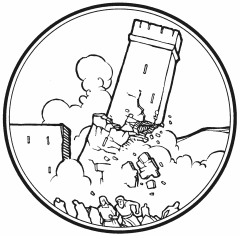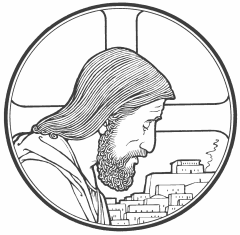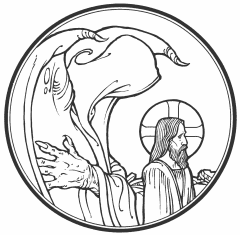 Grace, mercy, and peace to you from God our Father, and from our Lord and Savior, Jesus Christ, amen. The text for the sermon is the Gospel, which was read earlier.
Grace, mercy, and peace to you from God our Father, and from our Lord and Savior, Jesus Christ, amen. The text for the sermon is the Gospel, which was read earlier.
Of all of the parables that our Lord spoke, this probably ranks up as probably one of the least favorites. One of Jesus’ big words in our text for today is “repent.” Whether that means “face up to your sins and confess them” or “turn around and reorient your life,” it doesn’t have much of an appeal to us, does it? To make matters worse, there’s the story of a barren fig tree which faces the option of producing fruit or getting chopped down – which again, when applied to us, is less than inviting. So on the surface, at least, it adds up to a rather gloomy word, and it’s nobody’s favorite.
As Luke begins this portion of his letter, there is a group that comes to Jesus and does what they do best: complain. There are those in the crowd that complain to Jesus about some Galileans who were murdered by Pilate, suggesting that they were aware of how God does indeed punish sinners. Jesus proceeds to ask some questions to them that makes them think before they answer, questions that should make us think before we answer.
Jesus asks them, “Do you think that these Galileans were worse sinners than all the other Galileans, because they suffered in this way? No, I tell you; but unless you repent, you will all likewise perish.”
What a nasty thing our Lord says! He uses that word which should not be spoken: repent. It’s a word that no one wants to hear, especially being spoken to them. Brutal murders, shocking accidents, death in whatever form – all are sermons of God’s Law: the soul that sins will die. Death is one way God calls people to repentance, lest they perish eternally. Some falsely conclude that if nothing really bad happens to them in life, it is a sign that they have been living good lives. Jesus is teaching that not only certain very wicked people need to repent but repentance is necessary for everyone.
What a shocking statement for Jesus to make, that everyone needs to repent or perish. Who does He think He is to make such a bold, sweeping statement like that, the Son of God? Oh wait, that’s exactly who He is. He knows exactly what will happen to the unrepentant sinner and that is why He is here. He comes to urge the people to repent of their sins. He comes as the means of their repentance. He comes as the one who will give His life for the lives of the repentant. He comes and will be our Judge on the last day.
To reinforce His message, he tells a parable of the fig tree. Looking at Jesus’ parable, it’s straight talk. It’s not pleasant. It’s not comforting, and it’s nobody’s favorite. But there it is, straight and to the point. The terms are established by God, not us. Our excusing and rationalizing, our complaining and postponing, our good intentions and sincerity of purpose all evaporate into the air and the voice that speaks inquires about the fruits of our lives.
If you are uncomfortable with that, then that is the way it should be. God is very patient, not willing that any should perish but that all would come to repentance. However, the delay in judgment should not cause people to put off repentance. The time will finally come when the unfruitful tree is cut down. The opportunity for repentance does finally come to an end.
God is patiently calling us to repent. We return to Jesus’ parable about the fig tree. It wouldn’t bear any figs! Year after year it grew, but bore no fruit. The owner wanted to cut it down. But the vinedresser said, “Give me a chance with it. I’ll take care of it, there’s still a chance. If it doesn’t produce fruit for you next year, then cut it down.”
That fig tree is you. There’s so much good fruit that we could be producing, but we aren’t. God isn’t through with us yet. Jesus comes in as our friend, our Savior. He gives His life for us on the cross. He comes to us in His Word. He supplies our needs, comforts our fears, and dries our tears. He washes us clean in Baptism. He feeds us with heavenly food in the Lord’s Supper. He does all this, waiting for us to produce that fruit that He can use.
As patient and long suffering as God is, there is a deadline for our repentance. The writer to the Hebrews says, “It is appointed for man to die once, and after that comes judgment.” The tree in the parable has a year to bear fruit. In a similar way, those who refuse to repent in this life will be removed from the Kingdom of God in the next.
So what shall we do about it? How can we capitalize on the offer God makes? What response can we make? Jesus gives us the answer: repent. We do nothing more and nothing less than that. There’s nothing new to Jesus’ answer; and yet as old and as basic as it is we tend to forget it and act otherwise.
That is the central theme during the season of Lent. We sing just before we hear the Holy Gospel: “Return to the Lord your God, for He is gracious and merciful, slow to anger and abounding in steadfast love.” That return of which we sing is nothing short of repenting. How are we to repent? Why do we need to repent? Have we really done that bad that we need to repent? If we take stock of ourselves I think we’ll often find that we’ve been careless at some point or other in our lives—that we’ve lived as if God doesn’t matter, or allowed a cynical attitude to develop, or conformed to the mood and mindset of the age in which we live. In short, instead of living our lives according to God’s commandments and His ways, we live our lives in the way which makes us happy, regardless if it’s contrary to the Word of God.
How do we live then? The standard is too high, and we don’t even measure up to the “not good enough” of which Paul and Ezekiel speak of in our other readings for today. But God is on your side and wants you to flourish! The answer is and has always been and will always be Jesus. Jesus goes to the cross in order to buy you back and to restore you to your rightful place as God’s heir. He gives His life in order that your life will not be taken. He dies so that you will never die that final death.
Maybe the word “repent” isn’t so bad of a word at all. Maybe the parable of the barren fig tree isn’t so bad either, for it reminds us that life is to be lived on God’s terms, it also reminds us that life and can be good and full and productive. Once again, Jesus gives to us the words that are most needed – words that remind us what our heavenly Father desires of us and the gift of forgiveness that comes through repentance. In Jesus’ name, amen. Now the peace of God that passes all understanding, keep your hearts and minds through faith in Christ Jesus, amen.





